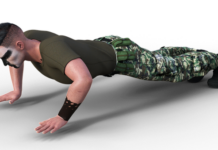Physical sport and exercise develop muscular fitness and increase people’s well-being and health. It is evident that whether they are sports or gentle exercises as if they are the so-called risky ones, good breathing is essential to face them.
A greater capacity of the lungs will always allow you to exercise with more rhythm and efficiency, since the air gives you the oxygen that your body needs. If you are starting to tackle a sport or activity in the gym, after a long time of not practicing any of it, you will surely think that your lungs are not enough and you will even interrupt the exercise before its completion because you do not have the lung capacity that you would need..

There are techniques that can help you increase the size of your lungs, and you also have methods to increase the amount of air your lungs can hold and to increase oxygen absorption. They are exercises that, practiced regularly, will significantly improve your lung capacity.
Here’s how to increase your lung capacity.
What do you need to increase lung capacity?
- a comfortable chair
- Water
- balloons
- Strips or tissues
- a treadmill
- A pool
- A bicycle
Instructions to increase lung capacity
- Take a deep breath. The easiest way to increase the amount of air in your lungs is to breathe deeply and practice it consistently. Start by exhaling all the air you have, extending your arms to help in the operation. Do not leave anything but exhale slowly. Try to lower the diaphragm as much as possible while the abdominal muscles relax. Then inhale as deeply as you can as well, noticing how your chest muscles tense up, to the point where it starts to feel uncomfortable.
- Wash your face with plenty of water. Bend your head over a sink and splash plenty of water on your face in one goes, as if you were pouring it into the sea or a river. As you do this, hold your breath. It has been proven that this exercise produces bradycardia that is, the heartbeat slows down, which is the first reaction of mammals when they dive. Use cold water but notice, because if not, it will cause a very rapid breathing effect, or hyperventilation, when what you should do is contain it.
- Relax and meditate. Sit in a comfortable place with good posture. Close your eyes and relax the muscles of the whole body, calmly. Meditate for several minutes on matters that are not of the day, memories, but that do not cause you any tension. When you feel relaxed, close your eyes if you haven’t already. Now you must inhale through your nose 8 times in a row without exhaling once, holding your breath. Then, exhale and repeat 2 or 3 more times the eight inhalations, without exhaling. At the end of each set, exhale very slowly and evenly. After three or four repetitions, your lungs will hold much more air than twenty minutes before.
- Simple exercises. You can also perform simple exercises anywhere when you have some free time. Inflate balloons, not only sitting, but walking or moving, which increases the effort. Let the balloon deflate, and inflate it again. Repeat continuously for 15 minutes. More: Stick a long strip of paper or tissue paper to the tip of your nose and blow on it with the intention of keeping it floating in the air for as long as you can. Do it for at least a quarter of an hour and repeat frequently.
- Hyperventilate. That is, breathe faster than normal for one minute. Then perform an inhalation exercise for a period of 2 to 20 seconds and then exhale for a period of 10 to 20 seconds. Then try to increase the times. With a little practice, you will see how your resistance and therefore your lung capacity increase
- Exercise in the water. You can perform exercises such as lifting weights or gymnastics in the water, since the resistance of the water causes you to need more oxygen and will make your lungs work harder. First you must perform the exercises in a normal way, out of the water, on the ground, platform or mat, bearing in mind that if it is with weight, it will be lighter in the water. Afterwards, you should be next to a swimming pool or similar, to dive up to your neck and do the same exercises. You should breathe shorter and faster.
- Cardio sports. Exercise and sports that favor the heart are also a good activity to improve lung capacity, especially aerobic exercises. The best sports are swimming -the best for the lungs-, riding a bicycle and running -better on a treadmill or on a track so as not to damage the knees-.
Tips to increase lung capacity
- Although it is known, you cannot aspire to increase your lung capacity if you smoke or are in continuous contact with smoke. Equally damaging is regular exposure to vehicular and industrial gases and fumes.
- If you practice diving, you must learn from professionals who will give you the precise instructions to breathe underwater, either with or without oxygen cylinders. To dive you must know what breathing techniques to use at each moment of the dive, be it deeper or rising to the surface, otherwise you may have serious health problems.

















